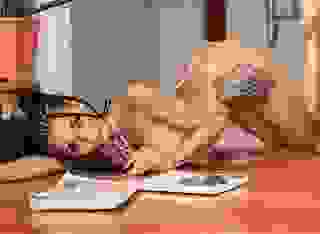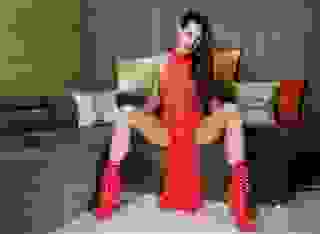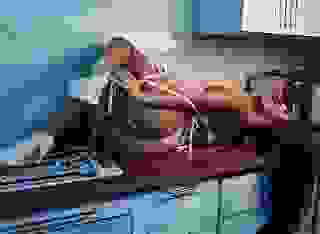- Romance
- Plum Creek
Note: You can change font size, font face, and turn on dark mode by clicking the "A" icon tab in the Story Info Box.
You can temporarily switch back to a Classic Literotica® experience during our ongoing public Beta testing. Please consider leaving feedback on issues you experience or suggest improvements.
Click hereBenjamin Edwin Roswell shifted his weight as Blue, his roan gelding, started up the slope to the crest of the hill. The hill wasn't high, really, but the slope was long and Benjamin felt Blue put in a little more effort than he did on flat ground. He wondered how the wagons had managed, then remembered hearing that most of the people heading to Oregon had used oxen to pull their wagons. Oxen were slow, but they could pull Hell off the hinges, or at least that's what his Uncle Amos had written in a letter once he got to Oregon.
Benjamin topped the hill and after working his way down the other side, was on relatively flat ground again. He hadn't gone far before he saw something that, even after seeing many along the trail, still sent a shiver down his spine. It was the partially exposed skull of a person that seemed to stare up at him with its empty eye sockets.
Benjamin knew the reason why a skull would be there in the ground between the two deep wagon ruts that marked the trail, because his Uncle Amos had written about that. Many people who started for Oregon with everything they owned didn't make it. Diseases like cholera, measles, diphtheria, and typhoid fever took their toll on the migrating people as did accidents. There was a timeline that had to be held lest the wagons be stranded in the mountains because of snowstorms. Graves were dug shallow to save time, and to keep wild animals from digging up the bodies the dead were sometimes buried in the trail itself.
There, the hooves of the oxen and horses would tamp the soil into a hard crust that most animals couldn't dig through. Over time, rain and the freezing and thawing of winter snows partially eroded the trail and exposed the skeletons of those whose families moved on without them. In the years the trail was used a lot, those traveling might stop to put some fresh soil over such a burial out of respect. Now, people were in the process of putting their lives back together after the end of what the North called "The War of the Rebellion" and the South called "The War for Southern Independence". A few wagons still traveled the trail, but most people were trying to repair what the war had broken.
Benjamin reflected that whoever this person had been, at least he or she had someone to care for them in their last hours. Such hadn't been the case at Andersonville, at least not for most of the prisoners of war held there. Benjamin had survived what he figured had to be worse than the Hell the preacher back home had promised to the unfaithful.
He had survived Andersonville by meeting and joining a group of Union infantrymen as soon as his unit had been captured. Together, they looked out for each other and shared what food and clothing they could find. They also constructed a rough shelter that kept them mostly out of the rain, and by huddling together in that shelter on winter nights, kept warmer than most.
When a man fell ill for some reason, there was little his group could do other than try to make the man as comfortable as possible. The Confederates didn't have enough medical supplies for their own troops, let alone for the Union prisoners in Andersonville. Usually, that man would die, and when he did, he'd be stripped of clothes, shoes, and anything else he had that would help the others. They all understood that as cold and cruel as it was, this was the only way the others could hope to survive.
Many in his group did die. Almost one in four did, mostly from disease. It was the camp that caused that disease. Benjamin smiled at the stupidity of whoever laid out the camp. There was a large stream running through the center that came from outside the stockade. The plan was for the prisoners to use the water upstream for drinking, the water in the center for washing, and the water just before it exited the stockade as a toilet.
That would have worked except for two things. There were more men in the camp than the stream could support, but the biggest reason was the Andersonville guards used the water outside the stockade in the same way. That meant the water the guards used for washing and as a toilet was the water the prisoners were expected to drink. As a result, cholera was a widespread illness that took many lives. Starvation took many as well. Benjamin himself was little more than bones covered with skin when the Union Army freed the Andersonville prisoners.
He'd spent almost a year with his mother and father recuperating, a year of seeing the horrors of Andersonville almost every night in his dreams. Once he'd regained most of his strength, he began helping his father in his father's general store in Hoyleton, Illinois.
It was work, and fatigue took the dreams away on some nights, but Benjamin was never really happy. He wasn't sure why, but working in the store was boring because he did basically the same thing every day. It was also uncomfortable. Benjamin didn't know why except that he was uncomfortable being around other people.
If he was in the store, he had to listen to the constant talk of people who seemed to talk just to hear themselves speak. Alone, he could think about what had been, what was now, and what might be. He'd been with so many men in such a cramped space for so long, he was happiest when he was alone.
Those same talkative people were also nosey. Benjamin had known most of them all his life, and they began asking him when he was going to take a wife and settle down.
"A fine, strapping young man like you shouldn't have trouble finding a woman. Just look around you, young man, and pick the one that suits your fancy", said the woman who taught school.
Benjamin thought maybe she was hinting that she wanted to be that woman. Most people in the town thought she'd end up an old maid. Martha Spires wasn't very pretty and she was at least ten years older than his twenty.
There were several girls his age or a little younger in Hoyleton, and they often stroked their hair or touched his arm when they talked with him. Benjamin smiled to be polite, but he wasn't looking for a wife, not until he got his life figured out.
Over the next seven years, Benjamin became more and more against the idea of being a storekeeper for the rest of his life. He didn't know what he wanted to do, but the boredom and the constant flow of people around him made him want to just walk out of town and keep going.
It was the day he unloaded a shipment of the new Winchester 1873 rifles that he made his decision. The teamster who drove the freight wagon told Benjamin about his brother.
"Yep, after the war, Nathan up and went to Colorado Territory. Said they's mining silver there. Well, he got there and tried mining, but it didn't work out too good so he started working on a cattle ranch. Says it's hard work but he makes good money and his room and board are free. I'd go myself if'n my wife would go, but she won't, so I guess I'll keep driving this here wagon 'til they put me in a hearse."
Benjamin hadn't thought about leaving Hoyleton for somewhere else, but the teamster's tale had sparked an idea in his head. When he was recuperating he'd read the letters from his Uncle Amos about his journey to Oregon. The stories about open prairies with grass tall enough to hide an ox, plentiful water, mountains that touched the sky, and more game and fish than he'd ever seen were too fanciful to believe then. Now, maybe there was something in the West he'd like better than keeping store. There was only one way to find out.
When Blue stumbled, Benjamin was shaken out of his daydream and he smiled. Leaving the store and Hoyleton was a damned stupid idea. That's what his father had said -- that it was a damned stupid idea - and Benjamin knew his father was very upset at the idea. His father was a devout Baptist and Benjamin had never heard him use the word "damned" before.
His mother looked at him with tears in her eyes.
"But Benjamin, if you go to Oregon, we'll never see you again. We'll never see your wife or our grandchildren."
Benjamin knew they wouldn't approve, but he was twenty-seven and couldn't stay at the store much longer. He was ready to start his life, whatever that life might be. His father had been paying him a little each week for his help in the store, but Benjamin hadn't spent much of the money. He used his savings to buy Blue and a saddle and bridle. Once his father was convinced he couldn't change Benjamin's mind, he gave him one of the new Winchester rifles and two hundred of the 44 Winchester Center Fire cartridges for the rifle along with a bullet mold, reloading tool, lead, primers, and powder to reload those cartridges. His mother gave him a small cast iron skillet, a small pot for coffee, a coffee cup and a bowl, five pounds of coffee, a side of bacon, and twenty pounds of dried beans to feed himself until he could get to another town.
On the 21st of April, Benjamin shook his father's hand, hugged his mother, and then rode Blue out of Hoyleton heading west. Three days later, he rode through the streets of St. Louis, Missouri after crossing the Mississippi, then on to Independence where he found the wagon ruts of the Oregon Trail and began following them.
Benjamin didn't expect to meet many people, and he was happy when he hadn't. He'd ride at a walk for about ten hours with a stop when the sun was overhead for a couple thin slices of bacon as a noon meal while Blue grazed and rested. Then, he'd ride until the sun was on the horizon.
He'd spent enough time in bivouac while in the Union Army to make camping at night second nature to him. He'd build a small fire with whatever he could find that would burn and cook his supper, then unroll his bedroll. As the sun went down, he'd drift off to sleep.
Along the way, he came across several wagons along the side of the trail. Most were disabled in some way -- a broken axle or broken wheel -- but a couple were mostly intact. He stopped and searched through them all to see if the former owners had left anything of use. He seldom found anything small enough to tie onto his saddle and still worth the effort to do so.
He understood the reason. Just as had been the case when the Union Army was marching through the South, supplies were crucial. Anything the Army could use and carry was confiscated. He figured the other travelers would have done the same with any wagon that couldn't continue the journey for some reason. Too often, that reason was the bones he'd find sticking up through the surface of the trail or the rotting wood markers that stood guard on the final resting-place of a person.
On one day after riding for what he figured was about four hundred miles from Independence, Benjamin found one wagon that looked to be in good shape and thought there might be something inside he could use. When he climbed into the seat and looked inside, his blood ran cold for a second. There, one on each row of packing cases that sat on each side of the wagon and held everything the family had owned, were two skeletons still in clothing. They were both half-covered by blankets, but the woman's dress showed and the other, larger skeleton was obviously a man. Lying beside the man was a ten-gauge, muzzle-loading shotgun. When Benjamin ran the ramrod down the bores, they proved to be loaded, and there were percussion caps on the nipples
Maybe they'd stopped and let the rest of the wagon train go on while they recovered from sickness, but then both died before they could catch back up. Maybe they'd been travelling alone. His uncle had written that some families did because it cost money to travel in a wagon train and they really didn't need a guide. The way was plainly marked by the wagon ruts. The man had probably kept the shotgun within easy reach in case someone or a wild animal tried to attack them.
Benjamin felt that he couldn't just leave them there, so he searched the wagon as well as he could without disturbing the bodies and found a small shovel. He dug one wide, shallow grave, and by wrapping the bodies in the blankets on which they lay, carried them from the wagon to the grave, laid them in side by side, and then covered them. He didn't know who they were so he couldn't put on a name, but he fashioned a cross from two boards he ripped from one of the packing cases and drove it into the ground at the head of the grave. Then, he began searching through the rest of the wagon.
He was opening the first packing case when he heard the nicker of a horse and it didn't sound like Blue. Benjamin walked to the front of the wagon, looked out, and saw a bay mare standing beside Blue. The mare didn't have a halter or bridle, but she didn't act like a wild horse either. When Benjamin approached her, the mare stretched out her neck and smelled him.
Benjamin gently scratched the mare's nose and when she didn't shy away, he continued his scratching down her neck. He figured she must have run away from a wagon train at some point and had somehow managed to stay alive. Benjamin took Blue's halter from his saddlebag, and started to put it on the bay horse.
"Easy there girl. Not gonna hurt you. Looks like you and Blue like each other, and I could use another horse in case something happens to Blue. There we go. You been haltered before, haven't you? Thought so. You stay here while I find something for a lead rope, and you can go with us."
Benjamin found a coil of rope in a box on the side of the wagon and cut a piece for a lead rope. He tied one end to the halter and the other to the wagon wheel where he'd tied Blue. The horse didn't shy or try to run. She only continued to snort and nuzzle Blue. Benjamin went back to searching the wagon.
In one case he found two sacks of dried beans, as well as a sack each of corn meal, flour, sugar, and salt. In another, he found clothing for the woman and closed that case back up. In a third, he found clothes for the man, but they were too small for him.
One other case held four blankets and cloth and other things for sewing and mending. The last case held a hatchet, axe, and other carpenter's tools. Benjamin took the hatchet and the axe, but left the rest. He didn't know what he was going to end up doing, but he knew he wouldn't be a carpenter.
The last case held something he could use. It held three bags of birdshot for the shotgun, as well as powder, wads, and four small cans of percussion caps. In a small pouch under two more blankets on the very bottom was sixty dollars in gold coins.
With another horse, Benjamin could carry all the food and other things he could use, but he needed a way to tie it on the horse. The shovel, hatchet, and axe he tied to his bedroll behind Blue's saddle. He used some rope to tie the shotgun under his left fender of his saddle. The powder, shot, and caps went into his left saddlebag. The money he added to his own money pouch and put it back in the right saddlebag.
After giving it some thought, Benjamin took all the blankets from the wagon, folded them into a thick pad, and placed it on the mare's back. By tying the twine puckering strings of the sacks of beans, corn meal, flour, sugar, and salt to each other, he could sling them in pairs over the bay's back. Benjamin secured them there with short pieces of rope under the horse's belly. The rest of the rope he coiled and hung from his saddle. Loaded like this, the sacks wouldn't stay in place if he moved very fast, but he didn't intend to go faster than a walk. Benjamin untied both horses, mounted Blue, and started away from the wagon with the bay mare following at the end of the lead rope.
As he had done every afternoon since starting out, when the sun was about an hour from setting, Benjamin began looking for trees on the prairie. The trail followed a main river, but cut across the widest bends to save some distance. In between were small streams that fed the river and those streams furnished enough water for willows and other trees to grow. He always spent his nights beside one of those streams. The trees hid his fire and furnished him with firewood. The stream furnished water for him and Blue.
Two days after finding the wagon, Benjamin was again looking for a stand of trees in which to camp for the night. He'd found two earlier, but they weren't as big as he liked and he still had a couple of hours of daylight left.
The sun was almost behind the hills ahead when Benjamin spotted the tall trees about a mile away from the trail. He turned Blue in that direction and after about half an hour rode into the trees and found a level spot beside the stream. He was unloading the mare when he heard the metallic "clack-clack" of a rifle action being worked. He turned slowly toward the sound and saw a woman standing beside a tree and holding what he recognized as a Henry rifle.
She was pretty young, maybe nineteen or twenty judging by her face, and she was having trouble keeping the rifle leveled at him. She kept letting the muzzle drop and then heaving it back up level, and it looked to him as if that was wearing her out.
Benjamin raised his hands and smiled as he walked slowly toward her.
"Hello there, Ma'am. I didn't expect to find anybody here, but I'll move on if that's what you want."
The woman took a step backward when he was a little closer, then stumbled and fell down. When Benjamin ran to her side, she was unconscious. He took the rifle from where it had fallen, leaned it against a tree, and then knelt beside the women.
As soon as he looked at her closely, he knew why she'd had trouble with the rifle and why she'd fallen. He'd seen the sunken in cheeks and eyes and skin that seemed too big for the body before. Those were the signs of starvation that he'd seen at Andersonville every day that he'd been there. He picked the woman up and carried her to where he'd dropped his bedroll, then unrolled it and laid her on top.
The woman needed food, but Benjamin knew she couldn't handle much at a time for a while. He built a small fire and while it was burning down to coals, he took his coffeepot to the stream and filled it.
When he got back, the woman was still not conscious, but he could see the pulse throbbing in her neck so he knew she was still alive. The fire was almost down to coals, so he sliced four thick slices of bacon, put them in his skillet, and set the skillet on the coals. While the bacon fried, he mixed some of the corn meal with water in his bowl and added a little sugar and a little salt to make johnnycakes.
When the bacon had fried enough to yield some grease, Benjamin poured a small amount of the batter into the skillet and watched it carefully so it wouldn't burn. When he judged it ready, he flipped it over to cook the other side.
Benjamin usually ate his supper right from the skillet, but he usually cooked his beans with his bacon. He didn't have a plate, so he broke off the end of a willow branch, stripped it of leaves, and laid the cooked johnnycake over the slender stems that remained. He had six of these flat cornbread cakes stacked on his rack and had started his coffeepot when the woman stirred. She sniffed the air and then tried to get up, but Benjamin pushed her back down.
"Ma'am, you'd best just lay there. You look starved almost to death, but I'll have some food for you in just a bit."
The woman looked up at him with glazed eyes and her voice was a raspy whisper.
"Who are you?"
"I'm Benjamin Roswell and I'm gonna help you. Now lay still for a bit more and then I'll help you eat."
The woman sighed but didn't try to get up again. Benjamin didn't think she could muster the strength anyway. He'd seen men who looked better just give up and die. He couldn't let that happen to this woman though. He didn't really know why, maybe because he'd already seen enough people starve to death, but he felt like he had to save her.
Benjamin fried the last of the johnnycake batter, and then picked up the willow branch rack and took it to his bedroll. The woman's eyes were open, but just barely. He broke a small piece from one of the johnnycakes, gently lifted her head, and said, "It's just a johnnycake, but looks like you haven't had anything better in a long time. You chew this good. Don't just swallow it or it'll make you sick."








